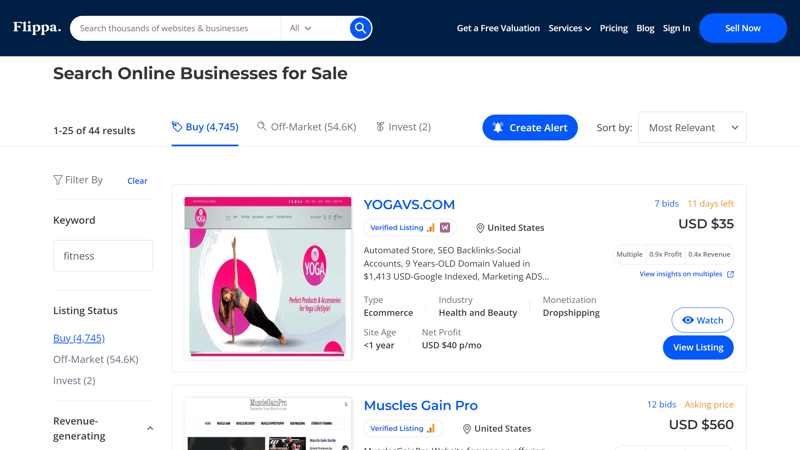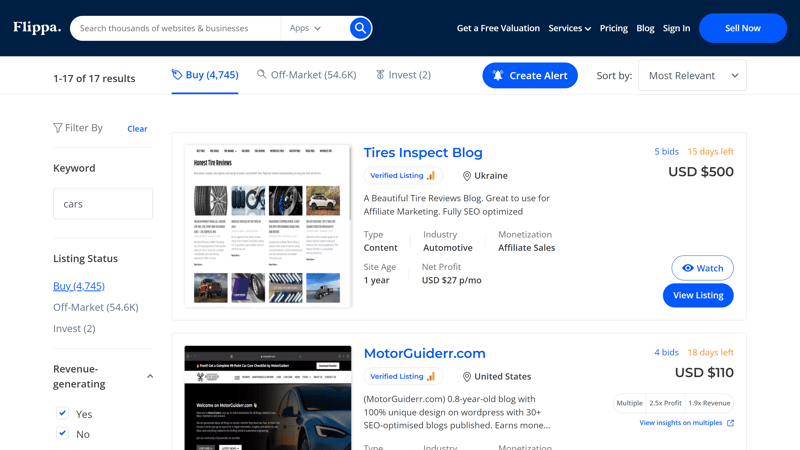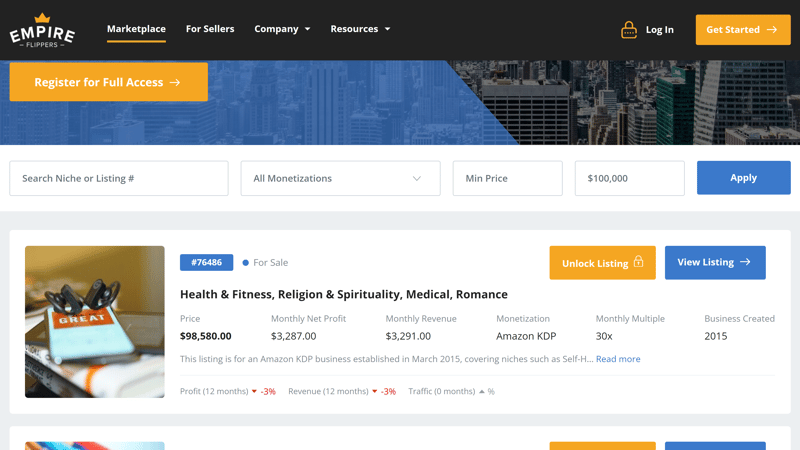How to Buy an Existing Website: Best Tips & Marketplaces
Launching a new website takes a lot of work: You need good content, a strong domain, high search engine rankings, and lots of traffic. None of this happens overnight – but there is a shortcut: You can buy an existing website.
We'll explain when it makes sense to buy an existing website, how to do it, and the best ways to determine a fair price it.
Why Should You Buy an Existing Website?
It usually makes sense to buy a “ready-made” website instead of building one from scratch. Here's why:
It saves time
Creating a website is a lot of work: You need to find web hosting and a domain, design the website, and provide (regular) content. When you buy an existing website, you can skip most of those steps.You get an audience
When you buy an existing website, you also get its audience and reputation. There's no need to start from scratch and you have a good foundation for future growth.You can monetize faster
The website you're interested in may already generate income, which will become yours as the new owner. Even if it isn't: Monetizing a website with visitors and traffic is simple.You acquire an established brand
An existing website may already have an established brand and a good reputation, which helps you build trust with your audience faster.
Buying an existing website can also backfire. Even if you take over a successful project, future success is not guaranteed. Here's why it might not be a good idea:
It requires startup capital
Creating a website yourself doesn't cost much. To buy a successful website, you need startup capital. Like any investment, it might not pay off.Your workload might be heavier than expected
You might only realize how much work a website needs after you purchase it. Over time, you could sink more time into repairs than you would have if you developed a new website.The website isn't a blank slate
A new website has 0 expectations and can be shaped to your preferences. With an existing website, you have less freedom: You might want to take it in a different direction which could alienate its existing audience.Hidden problems
Some established websites have problems that only become apparent after purchase, such as technical issues, poor SEO practices, or legal troubles.
So, make sure that you carefully consider whether to buy an existing website or start from scratch, as both have pros and cons.
Where Can You Buy Websites?
There are two main options: The easiest way to buy an existing website is through a website marketplace. But, you can also try to contact a buyer directly and privately arrange the sale. Let's take a closer look at both options:
Online Marketplaces
Online marketplaces are platforms that make buying and selling websites straightforward. You can browse websites currently listed for sale and filter search results.
Each marketplace works differently: Some auction off websites, while others allow direct purchases. Several cater to all types of websites, while others focus on specific kinds.

Browse through websites listed for sale using filters.
Almost all marketplaces make money through commissions, taking a percentage of the sale price. If you use them, you'll probably pay slightly more than you would if you bought the website without an intermediary.
However, website marketplaces make buying websites more convenient and safe. They usually require sellers to provide traffic and income data, which you would have to request in a private sale, and they do an initial screening. They also help sellers set realistic prices (more on that later).
Each marketplace has its quirks. Here are some of the most popular ones:
Flippa: For Online Projects of Any Size
Flippa is one of the largest and most versatile website marketplaces. Any kind of digital asset can be bought and sold here – from regular websites like blogs or online shops to apps and social media accounts.
Websites don't need to meet strict requirements to be listed on Flippa, unlike Empire Flippers. Sellers can put them on the auction block or set a fixed price.

Flippa is an online marketplace for all kinds of digital assets.
Flippa has extensive search filters. You can choose the digital assets you're interested in and refine results by cost, revenue, downloads, pageviews, age, seller location, and more.
Payments are made directly through the platform, which includes PayPal for small transactions (under $2,500). You can use the Escrow service to protect against risks and fraud.
Empire Flippers: For Larger Websites
Empire Flippers is a digital business broker specializing in established websites. Only projects that generate at least $2,000 in monthly net profits and can provide financial data for at least one year can be listed. This means that you'll only higher-priced websites on Empire Flippers -with sale prices starting at $50,000.

Empire Flippers is interesting for buying highly successful websites.
With its brokerage service's stricter selection criteria and more personalized support, Empire Flippers is a good choice for high-end acquisitions where both parties value the added comfort of a trustworthy intermediary.
Empire Flippers also offers an Escrow service for secure transactions.
More Marketplaces
Of course, there are many other online marketplaces where you can buy websites, such as:
Motion Invest: An online auction house for smaller (English-language) content websites.
Private Sales
Sometimes you can buy an existing website directly from its owner. This is especially true for smaller online projects whose owners haven't considered selling them.
This method requires more research and initiative: You need to find a suitable website, identify its owner, convince them to sell, and negotiate terms. You'll also be responsible for all the details, including the sales contract and escrow service.
You might get a better deal though: First, in a direct sale, sellers don't have to pay any brokerage fees, and keep more of the sales price. Second, you might catch the website owners at a good time when they're open to an unexpected offer.
If you buy through a marketplace, you benefit from established procedures and a helping hand throughout the sale. For private purchases, you are responsible for closing the deal. After negotiations, follow these steps:
- 1.
Do your due diligence: Thoroughly check out the website's financial, technical, and legal aspects. Analyze its revenue, profits, and traffic metrics (more on this later), and look for legal or other red flags.
- 2.
Prepare a sales contract: Prepare a detailed purchase agreement that includes all terms, such as the handover date and post-sale support.
- 3.
Settle on a price and payment method: Use a secure payment method, like an escrow service, to facilitate the transaction.
- 4.
Transfer ownership: Ensure that the domain, hosting, and all relevant login data have been correctly transferred. Plan for technical integration and any necessary training to continue operations smoothly.
How Do I Determine a Website's Value?
Whether you buy an existing website privately or through a broker, don't overpay for it. In private purchases, you're on your own during negotiations, but even with established marketplaces, you should know if a site is priced fairly.
Value is relative and ultimately determined by the market. With that said, there are some rules of thumb to follow.
Relevant Metrics
The monetary value of a website can be estimated using specific data. The website's current owner should be monitoring these metrics already:
Financial data
Check revenue and profits for the last 12 months, as well as monetization methods and upkeep.Traffic data
Analyze monthly visitor numbers, sources of traffic, and their geographic origins.Engagement data
Pay attention to things like time on site, bounce rate, and the percentage of returning visitors.Content and SEO data
Evaluate the content's quality along with that of its backlinks, and SEO performance.Technical data
Examine load times, mobile-friendliness, and the website's overall technical stability.Domain data
Take the domain's age and quality into account as well as any existing trademark or intellectual property rights.
When you buy an existing website through an online marketplace most of this information is included in the listing. If you privately purchase a website, you need to gather it yourself or ask the current website owner for it.
Rules of Thumb for Valuation
The metrics above are helpful but don't give you a magic number for a website's value. You need to calculate or estimate that yourself. Here are some practical rules of thumb:
- 1.
Profit multiplier: This method uses the website's monthly net profit, multiplied by a factor (multiple), to determine its sale value. The multiple depends on the website's quality, growth trends, revenue stability, traffic, and owner engagement. Multiples typically range from 12 to 50.
- 2.
Traffic value: This method calculates the traffic value based on the cost-per-click (CPC) values of a website's primary keywords. The CPC is multiplied by the number of monthly visitors. The resulting monthly traffic value can also be multiplied by a factor to estimate the website's total value. ahrefs Traffic Checker and other tools can help with this.
These rules of thumb can give a ballpark figure but don't provide an exact number. You can read more about website and domain valuation here:
Alternatives to Buying a Website
Are you having second thoughts about purchasing an existing website? One of these alternatives might be a better option:
Only Buy the Domain
If you have a specific domain in mind, you can purchase it separately. This way, you secure the domain name you want and can build your website on it without worrying about adapting existing content:
Have a Website Built
If you're ready to invest in a website, why not pay an agency or freelancer to make a custom one? This way, you get a professional web presence tailored to your needs.
Create Your Website With a Builder
Want to see if you can run a website first? You can use a website builder like Wix or Squarespace. These platforms offer user-friendly tools and templates for quickly and affordably creating a website, even without design or coding skills.
Conclusion
It can be worthwhile to buy an existing website instead of building a new one from scratch. You'll benefit from the previous owner's work and might reach your target audience and make money faster than you would otherwise.
However, do your homework before buying: Check that the website meets your needs and negotiate a fair price. You can purchase a website on a special marketplace like Flippa or Empire Flippers, or privately. The former streamlines the process, while the latter is often cheaper.


















